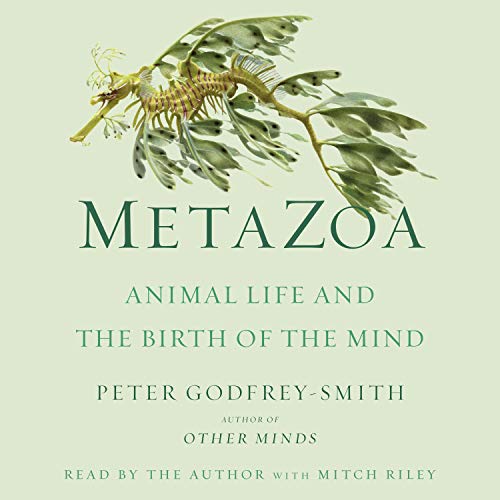Metazoa: Animal Life and the Birth of the Mind audiobook
Hi, are you looking for Metazoa: Animal Life and the Birth of the Mind audiobook? If yes, you are in the right place! ✅ scroll down to Audio player section bellow, you will find the audio of this book. Right below are top 5 reviews and comments from audiences for this book. Hope you love it!!!.

Review #1
Metazoa: Animal Life and the Birth of the Mind audiobook free
Most popular science books on consciousness start with the human brain: this makes sense as it is the consciousness we know best. In Metazoa, the philosopher Peter Godfrey-Smith takes a different tack. He looks at how phenomena such as point of view, subjectivity, sentience and other aspects of consciousness have likely evolved in the different biological kingdoms. This allows him to develop a broader view of consciousness than the standard lights on metaphor.
It is interesting to read Godfrey-Smiths speculations about the consciousness of different primordial aquatic and terrestrial species. And he successfully builds a plausible account of consciousness as evolution proceeds from sponge to fish to mammal.
In short, its a serious book with a serious intent to change the scientific/philosophical conversation around consciousness. It may well succeed in doing so. But if you are looking for genuinely new scientific phenomena you may be disappointed.
You might feel that another book containing another theory of consciousnesseven well supported by argument and evidence-is a little tedious. There are so many theories of consciousness getting published that you just dont feel like reading another one.
But for those who are interested in the ever evolving conversation around consciousnessboth human and animalthis provides a well-written and well-argued perspective. For those who like their science to be more settled, or have just read too many theories of consciousness to keep track of them anymore, another book might be a better choice.
Review #2
Metazoa: Animal Life and the Birth of the Mind audiobook streamming online
Author Peter Godfrey-Smith has written an interesting, informative and intriguing book that gives the reader lots of information to contemplate. I was searching for something to read that would activate my thought processes and found this…So glad that I found this one. I will also admit that it has been over 55 years since I thought about protozoa and anemones….
The text is presented clearly and concisely and at the end the author has a lot of foot notes that accompany the text. The pictures at the end are absolutely stunning and contain images of coral, tube sponges, a whale shark and more…(The Zoom is in effect for those readers that would like the pictures larger).
At the beginning, I felt as though I was underwater exploring the sea with him. The sponges, the shrimp and the octopus all captivated my attention. The nervous systems of all (except the sponge) are explained at this point. Later in the text, Haeckel, Darwin and other are mentioned including Descartes. Rene Descartes believed there was a sharp divide between the mental and physical aspects of humans.
Some of the studies that were so intriguing and informative to me were those done with the rats and the cuttlefish. Never would I have imagined that a rat could ‘play and re-play’ in their memory. Sentience is explored as well as dreams and the REM state… And, the discussion on birds and dinosaurs was indeed fascinating. I was equally intrigued with the toads and the chicks. The left and right side of the brain are discussed in this part of the text. My goodness, so much to absorb in this book for me.
As one might expect, memory is explored in great detail. Why in the world would a dolphin be attracted more to a man with red hair? And, I must also mention the octopus….
There is indeed a lot more in this book and I will be thinking about this for a while….Whether or not the idea of a connection between our minds and animal life exists will be up to you, as the reader, to determine. The author places facts and scientific studies in your hands…You make the decision.
Truly enjoyed reading this and found it to be extremely well written book with the text backed up with footnotes.
Most highly recommended.
Review #3
Audiobook Metazoa: Animal Life and the Birth of the Mind by Peter Godfrey-Smith
Peter Godfrey-Smith is a rarity – a science writer who connects with the layman. ALthough this treatise is great the author yearns for an even clearer ways to explain the subject. The writing is literary, even poetic. He presents, through the tests and research of numerous scientists, philosophers and famous people, current thoughts on the subject.
We start at the beginning, in the sea at life’s creation and how this is reflected in all living things. We meet “Adam”, an ancient flatworm and the ancestor of all animals. Evolution is revealed as a creative force, inventing eyes, flight, a snake-like body, fins, limbs, genders, warm blood, jaws – even life itself – multiple times. Unlike most works of this sort, the emphasis is on non-human minds, especially his favorite, the octopus.
This history serves another purpose. It lays the groundwork for his thesis – that just as the path to biological complexity was gradual, piecemeal and protracted so too was the mind. He rejects the notion that sentience is like “turning on the light bulb”, immediate and complete. Instead, in numerous examples and research, he posits that experience, awareness, a sense of self was also a gradual process. In his discussions on pain he adds a voice of caution for the blithe cruelty to animals in testing since many seem to possess some sense of awareness. Finally he discusses why computers will never be a mind since the mind is not a thing but the experience itself. My Grade – A+
Review #4
Audio Metazoa: Animal Life and the Birth of the Mind narrated by Mitch Riley Peter Godfrey-Smith
I stopped reading early on when the author began to discuss the relationship of the digital computer and the mind. Suspicious, I immediately searched for “pensose” in the text. This is penrose as in Roger Penrose who wrote “The Emperor’s New Mind,” way back in 1989. His writing invokes Kurt Godel’s Inompletrness theorem to establish that there is more to thinking than can be ascribed to algorithms (computers).
For the author to neglect this information points to either hubris or ignorance.
Review #5
Free audio Metazoa: Animal Life and the Birth of the Mind – in the audio player below
The scuba diving philosopher has written a sequel to his last best seller Other Minds developing similar themes about the evolution of animal sentience and consciousness. While observing the diverse marine fauna in their habitat and tracing their common evolutionary origins with their complex branching, he ponders the sentient changes graduating from the most basic organisms and culminating with the human mind. He shows remarkable skills for blending beautifully written zoological descriptions with astute personal observations combined with the latest findings of cognitive sciences, and with philosophical musings about the nature of subjectivity, selfhood and consciousness. By mastering this unique formula he grabs the readers constant attention, while guiding him through the realms of evolutionary genetics and morphology, animal behaviour experiments and the philosophical theories of Aristotle, Descartes, Heidegger, Wittgenstein, Dennett and Nagel. His overarching thesis is that all living forms have a degree of sentience to engage with their environment. This sentience comes into being gradually and in different degrees with Evolution. It evolves with the development of increasingly sophisticated nervous systems progressing from border line states to a fuller sense of subjective selfhood and in the process imparting unity and purposeful action for the organism. There is no sudden jumping up over thresholds from basic sentience to a fuller selfhood, within this gradual seamless evolutionary process.
Evolution has shaped animals through evolving nervous systems into centres of sentience and agency providing with various degrees a sense of the self. Engagement with the world through the senses leads to coordinated action within a unified organism controlled by a nervous system. Sentience comes into being gradually starting from the most basic multicellular animals to the Cephalopods, Arthropods , Birds and Mammals. Minimal sentience implies minimal cognition which leads to some kind of subjectivity. The author calls this subjective experience even in its most basic form, the animal experiential profile, that is the totality of sensory experiences from moment to moment. In animals with rudimentary nervous systems , these sensory experiences are not necessarily accompanied by the evaluative experiences such as pain, stress, fatigue etc. The add on qualia are progressively manifest in animals with more sophisticated nervous systems.
The Author rejects the notion that ones conscious experience can only contain one thing at a time , that is the narrow pathway views of experience advocated by the flat mind psychologists. Our experiential profile is much broader, containing both foreground and background attention with their dynamic interactions. His critical evaluation of artificial minds is pertinent as he reminds us that computers are designed to create illusions of agency and subjectivity, that cannot replicate the physical and biological basis of embodied human cognition and sentience. Again he criticises the anthropomorphic model of consciousness founded on a tacit selfhood, with its various neuroanatomical locations and inter-synaptic connections/correlations. This model propounded by some cognitive scientists, reduces the great diversity of animals sentience and ignores the wide spectrum of idiosyncratic subjective experiences in the zoological realm. Sensing and minimal cognition exist in all the life around us. The being there or the where and when kinds of experience, even as we lack appropriate descriptive words, can be inferred by observing different organisms in their respective habitat, from the crab to the octopus, from the bird to the dog.
He concludes that we must extend care and consideration to all sentient animals and protect their interests by giving up the traditional divide between humans and animals. This is an engrossing work that educates as well as enchants, while strengthening our emotional and cognitive bonds with the rest of life.
Galaxyaudiobook Member Benefit
- Able to comment
- List watched audiobooks
- List favorite audiobooks
Audiobook09 player
If the audio player does not work, please report to us, we will fix it as soon as possible (scroll up a little you will find the "REPORT CONTENT" button).
Hi everyone, please be noticed that the Audio player doesn't play next track on IOS version < 15.6. If you are facing that issue, just upgrade your IOS to version 15.6 to fix it. Enjoy!
Listen to this audio by click "Open Audio Player (new version)" (Please wait 6 Seconds and then open "Audio Player" in new tab).







0 Comments: